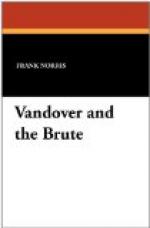* * * * *
That same morning Charlie Geary had eaten a very thick underdone steak for breakfast after enjoying a fine long sleep of eight hours. Toward eight o’clock he went downtown. He did not take a car; he preferred to walk; it helped his digestion and it gave him exercise. At night he walked home as well; that gave him an appetite; besides, with the ten cents that he saved in this way, he bought himself a nice cigar that he smoked in the evening to help digest his supper. He was very careful of his health. Ah, you bet, one had to look out for one’s health.
At the office that morning he had a long talk with Beale, Jr., as to Hiram Wade’s suit. The great firm of Beale & Storey, into whose office Geary had been received, made a specialty of damage suits, and especially those suits that were brought against a certain great monopoly which it was claimed was ruining the city and the state; such a case involving nearly a quarter of a million of dollars was now occupying the attention of the heads of the firm and, indeed, of the whole office. Hiram Wade’s suit was assigned to the assistants. Beale, Jr., was one of these, and Charlie Geary had managed to push himself into the position of his confidential clerk. But Beale, Jr., himself took little interest in the Wade suit; the suit against the great monopoly was coming to a head; it was a battle of giants; the whole office found itself embroiled, and little by little Beale, Jr., allowed himself to be drawn into the struggle. The management of the Wade case was given over to Geary’s hands.
When he had first heard of his assignment to the case Geary had been unwilling to act against his old chum, but it was the first legal affair of any great importance with which he had been connected, and he was soon devoured with an inordinate ambition to distinguish himself in the eyes of the firm, to get a “lift,” to take a long step forward toward the end of his desires, which was to become one of the firm itself. He knew he could make a brilliant success of the case. Geary was at this time nearly twenty-eight, keen, energetic, immensely clever; and the case against Vandover was strong. No one knew better than he himself how intimate Vandover had been with Ida Wade; Vandover had told him much of the details of their acquaintance. Besides this, a letter which Ida had written to Vandover the day before her suicide




